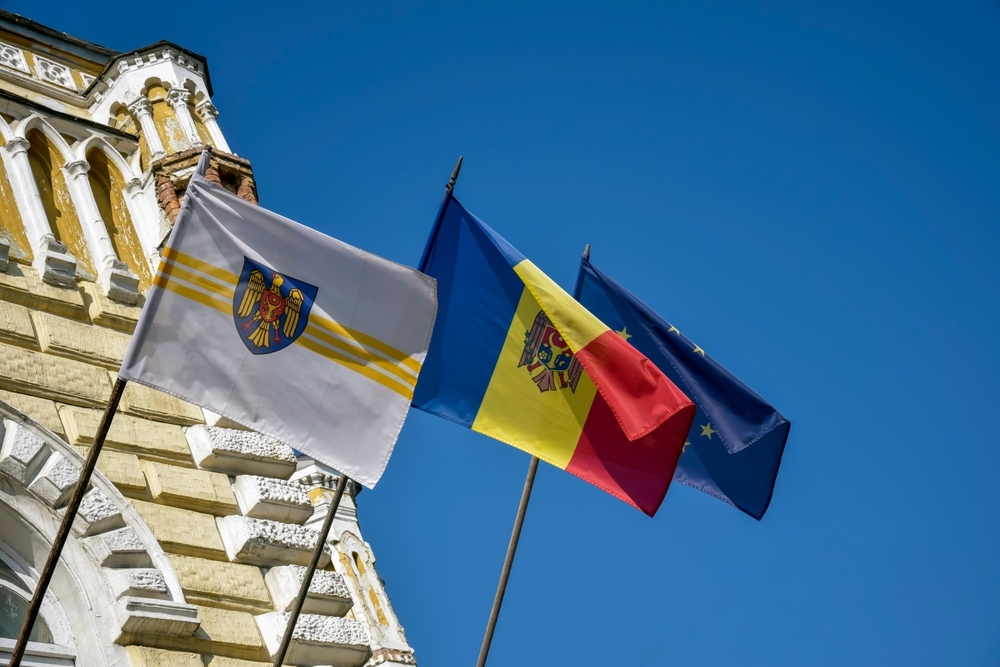Media legislation in the Republic of Moldova and harmonization with new European regulations
In the context of Moldova’s EU accession, ActiveWatch provides a thorough analysis of the country’s steps to harmonize its media legislation in accordance with EU provisions

Media-legislation-in-the-Republic-of-Moldova-and-harmonization-with-new-European-regulations
Flags of Moldova, European Union and city of Chisinau © MarinaNov/Shutterstock
This is a digest of our project partner ActiveWatch’ s findings. The full text of the analysis is available in English and Romanian on their website
Moldova’s progress toward EU accession has catalyzed important reforms in its media legislation, aimed at aligning national laws with European standards. Such progress is reflected in the in the 2025 Reporters Without Borders Press Freedom Index, where Moldova ranked 35th globally—surpassing several EU member states.
The country’s integration process began with the signing of the Association Agreement in 2014 and was formalized when Moldova obtained EU candidate status in 2022. Since the launch of accession negotiations in 2024, Moldova has taken active steps to reshape its media-related legal framework. The European Commission’s 2024 Enlargement Report highlights this progress, especially the adoption of new laws on access to information, limitations on media ownership concentration, and the creation of a media subsidy fund. While full EU membership is targeted for 2030, the outcome will heavily depend on political developments—particularly the parliamentary elections scheduled for September 2025.
Moldova has committed to aligning its media legislation with several key European acts, including the Audiovisual Media Services Directive (AVMSD), Digital Services Act (DSA), European Media Freedom Act (EMFA), and Digital Markets Act (DMA).
To support this harmonization effort, Moldova has established institutional and strategic frameworks involving both domestic and international actors. The Association Agreement, particularly Chapter 25, provides a foundation for cooperation in media and audiovisual policy, while national institutions such as the Center for Harmonization of Legislation coordinate the legal alignment process. These structures are complemented by national strategies, most notably the 2023–2026 National Program for Media Development and its corresponding Action Plan. Taken together, these initiatives reflect a participatory approach that involves government authorities, civil society, media organizations, and international experts.
The reform process has generally been viewed as transparent and consultative. Civil society groups have been actively engaged through working groups and parliamentary consultations. Nonetheless, some experts have raised concerns about the limited scope of public debate, pointing out that tight legislative deadlines may have prevented broader engagement from the media sector and other interested stakeholders.
Despite the notable achievements, Moldova continues to face several challenges in aligning its media legislation with EU norms. A central concern is institutional capacity. Regulatory agencies often struggle with insufficient staffing and low public sector salaries, which hinder their ability to implement and enforce the new regulations effectively. Another challenge is the continuity of political will. While the current administration has demonstrated clear commitment to reform, it remains uncertain whether this momentum can be maintained after the upcoming elections, particularly if the political landscape changes. Finally, structural issues within the media market persist. Experts argue that the EU legislation, while essential, does not fully address the economic fragility and lack of financial independence that continue to undermine many media institutions in Moldova.
In sum, Moldova’s recent reforms represent a significant step forward in its EU integration process and its effort to modernize the national media landscape. However, the long-term success of these reforms will depend on strengthening institutional resilience, maintaining political commitment, and ensuring sustained and inclusive public engagement. The results of the 2025 elections will play a decisive role in determining whether Moldova can carry these reforms into the next phase of democratic consolidation and EU accession.
This publication is the result of activities carried out within Media Advocacy Action for Moldova: Empowering Moldova’s Public Watchdogs to Safeguard Media Freedom, a project co-funded by the CEI Fund of the European Bank for Reconstruction and Development (EBRD), with the contribution of the Italian Ministry of Foreign Affairs and International Cooperation. All opinions expressed represent the views of their author and not those of the co-funding institutions.




